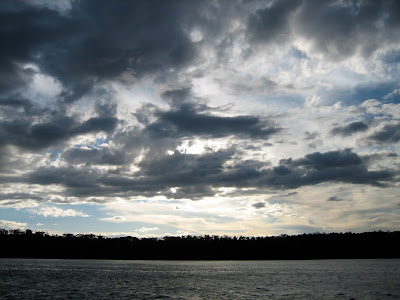Responding to contemporary converging crises
Human society faces a series of
converging crises in our economy, energy and ecology. It is very difficult to know exactly how these will interact and pan out. The depth and breadth of the problems can be overwhelming. Recently, a Christian friend asked me for personal advice as to what he can and should do to take these matters seriously. I made the following suggestions (what have I missed? Or how would you improve this list?):
1.
Give thanks for the good world. There is so much going wrong with the world and yet it remains a good gift of the Creator. It is right to grieve, but a healthy
grief requires the nurturing of our wonder and appreciation for the goodness of the creation that our actions are degrading.
2.
Repent of the patterns of consumption and acquisition that lie behind so much of our destructiveness. Billions are spent every year in a largely successful effort to
corrupt our desires, convincing us to covet the cornucopia of stuff that pours out of the world's factories. Learning
contentment is at the heart of a good response, since it frees us from feeling the need to protect our toys or way of life and so enables us to focus on what
is important and worth preserving (the glory of God, the welfare of our neighbour, communities of trust, the richness of God's creation, and so on). This may not end up "saving civilisation", but it helps us keep our heads when all around us are losing theirs.
3.
Stay rooted in the gospel of grace, hope, peace and joy that celebrates Christ's death and resurrection so that you are free to
grieve,
yearn,
groan and
lament, that is, to
pray. The temptation is to look away or harden our heart to the damage and the danger because it hurts too much.
4.
Reject false hopes. We are not going to make it out of this place alive, either personally or as a society. The goal is not to secure immortality, but to love, trust and hope. Society is likely to change significantly or even radically during our lifetimes. The myths of
endless growth,
progress and
individualism are likely to be unmasked for the illusions that they are (though this will be resisted because people hate to lose their dreams, far less to admit that their dreams were actually a nightmare). New illusions are likely to replace them.
Survival is not your highest goal. Self-protection is a secondary consideration.
5.
Assess your life and habitual patterns to see where your ecological footprint can be significantly reduced:
eating less meat, flying less frequently or not at all, driving less or not at all, switching to a renewable energy provider, investing in insulation and local power generation, avoiding all unnecessary purchases and buying responsibly (e.g. food that hasn't been strip mining the soil, local products, durable products, and so on).
6.
Invest in communities of trust. If and when things get difficult or there are significant disruptions to "normal", then people tend to distrust strangers, but to keep their friends closer. Get to know your neighbours and people in your local community. Strengthen your ties to a local church.

7.
Engage organisations seeking to transition to a more resilient and less destructive society (such as the
Transition Network, concerning which I'll have more to say soon).
8.
Get out of debt, as far as possible. Debt is
a bet that the future is going to be more prosperous than the present so that I can incur debt now and will have plenty to pay it off later. This assumption is becoming increasingly dangerous. Owe nothing to anyone except to love one another (Romans 12.8).
9.
Petition governments and corporations as citizens, not simply consumers. The roots of our problems are far larger and more systemic than consumer choice or personal greed. Structural changes are required to reduce the damage we are doing.
Here is a good example of a letter to banks that briefly makes the case for disinvestment in fossil fuel projects on both ethical and business grounds. Such engagement may begin with petitions or letters, but it certainly needn't end there. Civil disobedience has a noble history in reforming unjust laws and practices.
10.
Learn to garden or some other useful
skill that you can share with others and which keeps you
grounded in the material basis of our existence.
11.
Keep learning more about the world and its problems and opportunities. We live in a
novel period historically and we currently have the benefit of a large and growing body of research into these matters. Having some idea of the
major threats and what they might mean for you, your community, your society and the world helps to orient your practical reason and will make you a more responsible citizen and neighbour.
12.
Proclaim the good news, using every means you have, that Jesus is the true and living way,
the dawn from on high that has broken upon us who live under the shadow of death and ecological disruption, and which guides our feet in the way of peace.


























